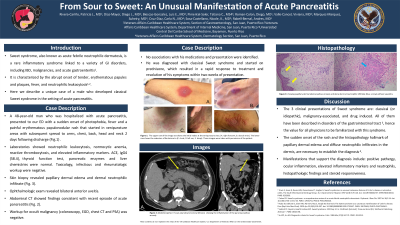Sunday Poster Session
Category: Biliary/Pancreas
P0152 - From Sour to Sweet: An Unusual Manifestation of Acute Pancreatitis
Sunday, October 27, 2024
3:30 PM - 7:00 PM ET
Location: Exhibit Hall E

Has Audio

Patricia Rivera, MD
VA Caribbean Healthcare System
San Juan, Puerto Rico
Presenting Author(s)
Patricia Rivera-Carino, MD1, Diego Diaz-Mayor, MD1, Luis Biescas-Gonzalez, MD1, Diego Roman-Colon, MD1, Tatiana C. Pimentel-Soler, BS2, Viviana Valle-Cancel, MD1, Suheiry Marquez-Marquez, MD1, Carla Cruz-Diaz, MD1, Nicole Sosa-Castellano, MD1, Andres Rabell-Bernal, MD1
1VA Caribbean Healthcare System, San Juan, Puerto Rico; 2Universidad Central del Caribe School of Medicine, San Juan, Puerto Rico
Introduction: Sweet syndrome, or acute febrile neutrophilic dermatosis, is a rare inflammatory syndrome linked to a variety of GI disorders, including IBD, malignancies, and acute gastroenteritis. It is characterized by the abrupt onset of tender, erythematous papules and plaques, fever, and neutrophilic leukocytosis. Here we describe a case of Sweet syndrome in the setting of acute pancreatitis.
Case Description/Methods: A 48-year-old man presented to our ED with a sudden onset of photophobia, fever and a painful erythematous papulonodular rash that started in venipuncture areas with subsequent spread to arms, chest, back, head and neck 2 days after hospital discharge for acute pancreatitis (Fig.1A). The rest of his physical exam was normal. Laboratories showed neutrophilic leukocytosis, and elevated inflammatory markers. ACE, IgG4, thyroid function, pancreatic enzymes and liver chemistries were normal. Toxicology, infectious and rheumatologic workup were negative. Skin biopsy showed papillary dermal edema and dense dermal neutrophilic infiltrate without vasculitis. Ophthalmologic exam revealed bilateral anterior uveitis. Abdominal CT showed findings of acute pancreatitis (Fig.1B). Workup for occult malignancy including a recent colonoscopy, EGD, chest CT and PSA were normal. No associations with his medications and presentation were identified. He was diagnosed with classical Sweet syndrome and started in prednisone which resulted in complete resolution of symptoms within two weeks.
Discussion: The three clinical presentations of Sweet syndrome are the classical or idiopathic, malignancy-associated, and drug induced. All of them have been described in disorders of the GI tract, hence the value for all physicians to be familiarized with it. The sudden onset of the rash and the histopathology hallmark of papillary dermal edema and neutrophilic infiltrates in the dermis are necessary to establish the diagnosis. Classical Sweet syndrome is not associated with malignancy or drug exposure. This diagnosis is supported in our patient by the presence of abrupt onset of skin lesions, high fever, positive pathergy, ocular inflammation, elevated inflammatory markers, neutrophilia, complete response to steroids, and negative infectious, rheumatologic, and malignancy workup. It is believed that hypersensitivity and cytokines play a role in the pathogenesis of this syndrome. Type 2 autoimmune pancreatitis could be a possible cause for this patient’s pancreatitis, especially after all other causes were ruled out.

Disclosures:
Patricia Rivera-Carino, MD1, Diego Diaz-Mayor, MD1, Luis Biescas-Gonzalez, MD1, Diego Roman-Colon, MD1, Tatiana C. Pimentel-Soler, BS2, Viviana Valle-Cancel, MD1, Suheiry Marquez-Marquez, MD1, Carla Cruz-Diaz, MD1, Nicole Sosa-Castellano, MD1, Andres Rabell-Bernal, MD1. P0152 - From Sour to Sweet: An Unusual Manifestation of Acute Pancreatitis, ACG 2024 Annual Scientific Meeting Abstracts. Philadelphia, PA: American College of Gastroenterology.
1VA Caribbean Healthcare System, San Juan, Puerto Rico; 2Universidad Central del Caribe School of Medicine, San Juan, Puerto Rico
Introduction: Sweet syndrome, or acute febrile neutrophilic dermatosis, is a rare inflammatory syndrome linked to a variety of GI disorders, including IBD, malignancies, and acute gastroenteritis. It is characterized by the abrupt onset of tender, erythematous papules and plaques, fever, and neutrophilic leukocytosis. Here we describe a case of Sweet syndrome in the setting of acute pancreatitis.
Case Description/Methods: A 48-year-old man presented to our ED with a sudden onset of photophobia, fever and a painful erythematous papulonodular rash that started in venipuncture areas with subsequent spread to arms, chest, back, head and neck 2 days after hospital discharge for acute pancreatitis (Fig.1A). The rest of his physical exam was normal. Laboratories showed neutrophilic leukocytosis, and elevated inflammatory markers. ACE, IgG4, thyroid function, pancreatic enzymes and liver chemistries were normal. Toxicology, infectious and rheumatologic workup were negative. Skin biopsy showed papillary dermal edema and dense dermal neutrophilic infiltrate without vasculitis. Ophthalmologic exam revealed bilateral anterior uveitis. Abdominal CT showed findings of acute pancreatitis (Fig.1B). Workup for occult malignancy including a recent colonoscopy, EGD, chest CT and PSA were normal. No associations with his medications and presentation were identified. He was diagnosed with classical Sweet syndrome and started in prednisone which resulted in complete resolution of symptoms within two weeks.
Discussion: The three clinical presentations of Sweet syndrome are the classical or idiopathic, malignancy-associated, and drug induced. All of them have been described in disorders of the GI tract, hence the value for all physicians to be familiarized with it. The sudden onset of the rash and the histopathology hallmark of papillary dermal edema and neutrophilic infiltrates in the dermis are necessary to establish the diagnosis. Classical Sweet syndrome is not associated with malignancy or drug exposure. This diagnosis is supported in our patient by the presence of abrupt onset of skin lesions, high fever, positive pathergy, ocular inflammation, elevated inflammatory markers, neutrophilia, complete response to steroids, and negative infectious, rheumatologic, and malignancy workup. It is believed that hypersensitivity and cytokines play a role in the pathogenesis of this syndrome. Type 2 autoimmune pancreatitis could be a possible cause for this patient’s pancreatitis, especially after all other causes were ruled out.

Figure: Figure 1: (A) The upper row of the image set shows the initial nodes at the venipuncture sites. The lower row shows the extension of the lesions to the limbs, the trunk, and the head. These images were taken with permission of the patient. Abdominopelvic CT scan axial and coronal views (B) showing the inflammation of the pancreas (yellow arrows).
Disclosures:
Patricia Rivera-Carino indicated no relevant financial relationships.
Diego Diaz-Mayor indicated no relevant financial relationships.
Luis Biescas-Gonzalez indicated no relevant financial relationships.
Diego Roman-Colon indicated no relevant financial relationships.
Tatiana Pimentel-Soler indicated no relevant financial relationships.
Viviana Valle-Cancel indicated no relevant financial relationships.
Suheiry Marquez-Marquez indicated no relevant financial relationships.
Carla Cruz-Diaz indicated no relevant financial relationships.
Nicole Sosa-Castellano indicated no relevant financial relationships.
Andres Rabell-Bernal indicated no relevant financial relationships.
Patricia Rivera-Carino, MD1, Diego Diaz-Mayor, MD1, Luis Biescas-Gonzalez, MD1, Diego Roman-Colon, MD1, Tatiana C. Pimentel-Soler, BS2, Viviana Valle-Cancel, MD1, Suheiry Marquez-Marquez, MD1, Carla Cruz-Diaz, MD1, Nicole Sosa-Castellano, MD1, Andres Rabell-Bernal, MD1. P0152 - From Sour to Sweet: An Unusual Manifestation of Acute Pancreatitis, ACG 2024 Annual Scientific Meeting Abstracts. Philadelphia, PA: American College of Gastroenterology.
